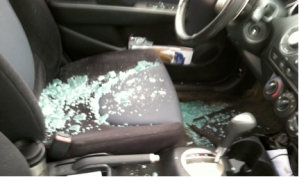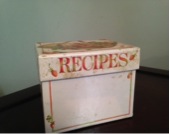When I worked as a writing instructor—both as a graduate student teaching freshman composition and in my work at a writing center—I found myself constantly steering students away from certain personal narratives, so familiar to anyone in this field as to become cliché: “The Dead Grandma Essay,” “The Car Crash Story,” “The Big Game.” It seems we are drawn to certain events in our lives, the ones that most closely mimic our understanding of story, of what we see in movies: a universally understood setting, some event happens, and we are not the same as we once were.
I grew tired of reading dozens of these “essays,” their predictability: hard work and practice leads to victory at the state championship game, or, the meaning of teamwork and sportsmanship are learned in defeat; we need to be more careful and always wear our seatbelts, we must appreciate how quickly the things and people we love can be taken away. I was (and am) amazed that so many people could have experiences so substantial—so important to their personal mythology—yet they all take away nearly identical conclusions or reflections. What does it mean that the biggest moments of our lives are so unsurprising?
~
Lately my life consists mostly of waiting. Waiting to hear back on a grant application that could radically alter the next three years of my life. Waiting for news on a manuscript under “final consideration,” whatever that means or I hope it means. Waiting for an update on the 20 or so teaching jobs I’ve spent too much time and money and energy applying for over the past eight weeks, obsessively checking RSS Feeds and Wikis that only serve to fuel my obsessive nature, the hopes of any news at all that will let me leave the retail job I’ve desperately needed for the past two years. Waiting for this beautiful eight-month old girl to please, please, go to sleep.
I am tired of waiting. As an experiment, I tried writing a few essays that are “in the moment,” meaning that, true to the essay form, I am doing my best to mimic my thought process at any given time. The problem with this is that, unlike most of my other writing, I am not allowing myself to fall back on any research, not allowing myself to fragment or weave several narrative strands. I am doing my best to do away with the hindsight that clouds my other work, the distance from events that allows me to shape the narrative into whatever I force upon it. I am trying to find meaning in a world where my purpose is not yet clear.
I don’t think it would be fair to call it a disaster, but close enough to it. In the hopes of writing something meaningful or interesting I end up talking about my problems, worries, fears. I read it back now and it all sounds angry, jaded, afraid. I feel terribly sorry for myself. Of course, this is all accurate, but it doesn’t make for particularly compelling work.
The experiment has shown me how much I rely on certainty. I’m at my worst when I’m so worried, struck with the special kind of silence that comes from waiting like this. I cannot write clearly about what I don’t yet know.
~
My problem has never been with the students, but the structure of the assignment: what can be expected of a teenage kid when we ask them to teach us about life in five to seven pages? By forcing them to write this way—to demand reflection and conclusions—we are asking them to write about something that has already happened, been overcome. What sort of stakes can be found in such writing?
I find myself rejecting (or at least resisting) the idea of personal narrative. I’m not sure why I’m so bothered. Perhaps it has to do with my general dislike/distrust of memoir, with any story that finds its value in the accuracy of its facts. Perhaps it has to do with the connections I see between this writing and the academic, five-paragraph sort: trying too hard to teach me a lesson, focused on things that are over and done. Or maybe it comes from my Midwestern upbringing: passive aggressive behavior and an inability to share what’s on my mind. Perhaps, ultimately, it comes from a lack of life experience, from a fear of my own ignorance, a worry that I have nothing worth saying.
~
According to the police report, both vehicles began to reverse from their spots almost simultaneously. The driver of the orange Sedan had backed completely from the parking space, straightening out his car in the lane before noticing the back end of the silver SUV heading toward him. The driver of the orange Sedan honked his horn, though the driver of the silver SUV either didn’t hear the sound or had insufficient time to react. The silver SUV then made contact with the front driver’s side door of the orange Sedan, crushing the front quarter of the vehicle. The driver of the orange Sedan sustained minor cuts and bruising. The driver of the silver SUV was left unharmed.
~
Perhaps collisions are essays in themselves: an attempt to connect two separate objects, to see how they act upon each other. Meaning comes as the space between them becomes smaller and smaller. Until they become inseparable.
~
I have been in accidents before: sliding backward into ditches, spinning out on iced over roads. But this accident was the first involving injury, the first time I’ve felt the crunch of impact, of the car’s steel frame buckling, wrapping itself around me, designed to break apart in such a way. I felt the crystalline glass of the window raining down upon me: the cuts and slivers so small as to be felt but not seen, not so easily removed.
~
There are reasons to be grateful: both vehicles were traveling at parking lot speeds, my infant daughter was not in the car at the time; the accident was caught on surveillance camera, absolving me of blame; all injuries were superficial.
There are reasons to lament: I had just got my car back from the shop after a similar accident my wife experienced two weeks prior; several other high-cost emergencies over the past several months, draining our savings; the driver at fault has no insurance.
~
I am in a daze. I am standing in the cold, trying to find the phone number for non-emergency police situations before saying screw it and dialing 911. I can hear the Other Driver talking on her phone, asking the other end what will happen when the police discover she has no insurance.
I pretend not to hear because I am not yet ready to deal with this information, though it creates an incongruity when the police. The Other Driver insists to the officer that she simply cannot find the paperwork. She knows she is lying, I know she is lying, the officer likely assumes she’s lying, but we leave the scene pretending that yes, it will all be okay and, yes, the ticket will be cleared once you provide proof, just fax it over and all will be forgiven. We leave the scene hoping for it to be true, for our problems to magically fix themselves.
~
Perhaps the personal narrative is like Zeno’s arrow paradox: for motion to occur, the arrow must change its position. However, in any given instant, the arrow is not moving from the point where it is because no time has passed. If every moment is motionless, and time is made of moments, then motion is impossible.
Perhaps these two objects can never come together. Gaps exist, will always exist. Perhaps this is the reader and writer reaching for a connection that never comes and never will. Perhaps it is our frustration—those silent gaps we attempt to fill with noise—that keeps us concluding otherwise.
~
The problems do not go away. I leave the scene with the weight of guilt. That the Other Driver has a court date and substantial fines and (much later) fucked up credit because of the collection agency working on my insurance company’s behalf. That my insurance agent assures me that they will go after her for everything she’s got, a tone of malice and retribution I do not appreciate. That I have received letters in the mail from lawyers warning me to act now if I want to sue for sustained injuries. That a local chiropractor has offered me free “recovery alignment” coupons, and I have no idea how they found my contact information. That I am physically fine, my car has been repaired, and by the time I am compensated in an estimated three years, the money will be an unexpected and pleasant surprise.
~
Perhaps the problems of the personal narrative have nothing to do with cliché, but grandiosity. We like explosions, life & death circumstances, a little sex appeal. We sometimes believe that the personal narrative demands this type of structure: our loudest, most outrageous. I would argue that the essay finds it’s greatest meaning in the white space, the silence, the gaps between what’s been written and what we bring to it.
~
I receive a text message from the Other Driver, asking if we can take care of this accident without getting our insurance companies involved. She does not know that I know about her insurance, and for whatever reason I continue to play along. But still I must tell her sorry, the cost is just too high, that I needed to get a rental car as soon as possible, that I already received an estimate upwards of 3000 dollars. She responds with an apology, and we never speak again.
The Other Driver has become a ghost. She does not respond when a claims adjuster attempts to contact her by phone and mail. I am told that if she does not respond, my story will be the only one on official records, meaning that she will be completely at fault with no opportunity for defense. I know this to be her choice. Like pretending to have insurance, it seems the Other Driver believes that avoiding the accident—ignoring the calls letters of collection—will make it all go away. She believes her silence may somehow save her.
~
Perhaps the personal narrative demands conclusions because we desire what we cannot have. We demand conclusions because we there are things we do not like about ourselves: high school championship glory fades, as does our grief. Accidents still happen, mistakes are made, and yet we will continue to do dumb shit anyway. We want there to be more, to feel like every moment holds a special meaning. And if we draw those conclusions, play along with the idea that everything means something, maybe someday we’ll start to believe it.
~
It is several weeks later with little resolution. My door has been replaced, repainted. Structural integrity confirmed yet reinforced anyway. A well-timed Christmas bonus, along with a rare payment for my writing, just barely covers my deductible. Money provided, as if by magic. Meanwhile, a slew of professional, creative, and personal rejections fill me with an ever-encroaching sense of dread. Outside, snow covers everything, blanketing the neighborhood. The snow muffles, absorbs, and despite the world happening around me, this silence so strong as to be felt.




